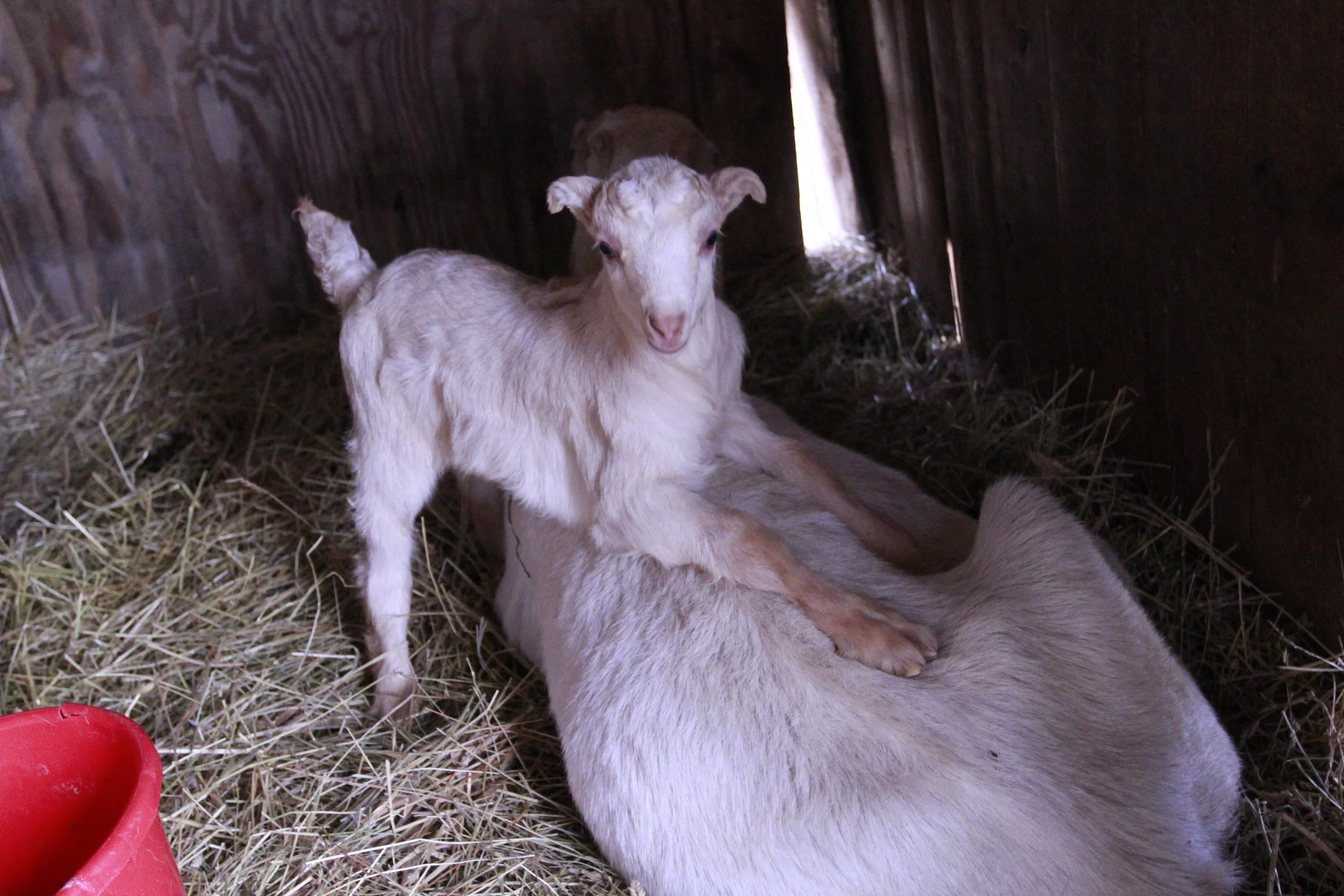How Do Goats Stay Warm in This Cold Weather?
Maggie Maginness
Kids snuggle up under the hay manger to stay warm.
The weather last week put our goats to the test. We had temperatures below zero, wind and snow, and the goats were out there in the barn giving birth. Herd manager and Goatsbeard Farm co-owner Jenn Muno is often asked how the goats stay warm in this kind of weather.
Customers wonder if the family brings goats in the house, or if there are heaters in the barn.
The answer to both of these questions is, no, because goats have their own heaters!
Goats and other ruminants (cows and sheep) have an special chamber in their digestive system called the rumen. The rumen is a kind of stomach, but instead of being filled with acid to break down food, the rumen is teeming with specialized bacteria that break down food into forms of energy and nutrients that the goats’ bodies can use. A normal by-product of the work of the bacteria is heat. So inside each well-fed goat is a little furnace emitting steady heat. Goats need fuel for the rumen, like we would need food for a wood stove. For our goats this means grass and alfalfa hay.
In the weather we had this last week, a rumen alone is not enough. One of the most important resources all goats need is a dry area that is sheltered from wind and rain. In the summer, the same shelter gives them shade, so their rumen can work without over-heating them. Goatsbeard has a barn that is open on most of one side, with a couple more doors, so the goats get plenty of air circulation, but also have a windbreak. The roof keeps the rain and snow out, but goats also need clean fresh bedding provided on a daily basis. Without new bedding the barn would quickly become a muddy, poopy, urine soaked mess. If you’ve ever slept in a tent that leaked in a rain storm, then you know what a difference have a dry place to sleep can make.
On cold nights, the goats fill their rumens with hay, make a sort of nest in the hay and curl up to sleep inside the barn with all the doors pulled shut. On really cold nights they line up and sleep next to each other and share body heat.
The heated waterer provides a wind break, a little warmth and a good place to gossip.
Of course, staying warm as a newly born, soaking wet kid is a little more difficult. Adding to the problem of keeping kids warm is their small size (just a few pounds) and that their rumens are working yet. The rumen needs forage (grass or other plant material) to work and these babies start off with empty stomachs that get filled with milk. They also don’t have the necessary bacteria, yet. Over the next weeks and months, they slowly build up the capacity of their rumen by starting to eat hay and then grain and slowly building a healthy population of bacteria.
So, newborn and young kids are particularly dependent on their mamas and a little help from humans on these sub-zero nights. We work with the mamas to dry the kids off quickly and stimulate their circulation—we use newspaper and towels, the mamas use their tongues. Next we make sure each new kid figures out how to use those wobbly legs and get up and get a drink of warm milk. Finally, kids settle down and snuggle up with mama in a dry next of hay to stay warm at night.
Sadly one part of the kids that is particularly vulnerable are the beautiful floppy ears of the Nubian crosses. These can get frost bit in the cold. We had a few of those this week, but the good news is that while they get swollen and probably sore, they eventually heal and have no problems in the future.
In the meantime, these little goats (and maybe a few of us with cabin fever) will have to dream of hot summer days when those big floppy ears will be an asset, helping them get rid of excessive body heat, rather than a liability, leaking needed body heat.
The barn provides a dry place out of the wind for the goats.



